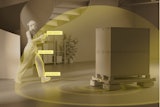Tom Lego the manager of Toyota’s National Customer Center, took the time to discuss the company’s material handling business. He discusses the advantages of domestic operations, the touchstones of the company’s success, current trends and much more.
Maura Falk: I think when people hear the name Toyota they often think of a company based overseas, but Toyota Material Handling is actually based in the U.S. and makes many products with a domestic focus, can you please speak to these products and even the various U.S. plants?
Tom Lego: Toyota first established a lift truck dealership in the United States nearly 50 years ago with a dedicated focus on sales and service to the North American market. During the course of the next few decades, Toyota continued to evolve its product lines. In 1990, Toyota started producing lift trucks in Columbus, Indiana at Toyota Industrial Equipment Mfg., Inc. (TIEM), the first Toyota lift truck manufacturing plant outside of Japan.
Since the first lift truck rolled off the production line 25 years ago, TIEM Associates have built more than 500,000 lift trucks and Toyota has steadily grown in the North American market to become the number one lift truck supplier since 2002. Today, the majority of all Toyota lift trucks sold in North America are produced at TIEM.
Toyota has become the industry leader through quality of engineering design, coupled with leading-edge manufacturing capabilities. TIEM has the capability to manufacture a wide range of industrial equipment used in a variety of indoor and outdoor environments including: 3-wheel and 4-wheel electric lift trucks, internal combustion cushion tire and pneumatic tire lift trucks and DC/AC inverter assemblies for the Toyota Tacoma.
Toyota Material Handling North America (TMHNA) is also based in Columbus, Indiana. TMHNA is the North American division of the Toyota Material Handling Group. TMHNA is responsible for the North American market and is focusing on ways to improve its service to its customers, increase its share of market and improve profitability.
TMHNA’s head office is located in Columbus, Indiana. However, there are other important business locations based in Greene, New York, Muscatine, Iowa, and Syracuse, New York.
MF: What are some of the benefits to having operations based on U.S. soil?
TL: Toyota’s Columbus, Indiana manufacturing facility and the addition of the national headquarters representing a recent additional $4.6 million dollar investment into the community has now grown to over 1 million square feet of manufacturing and support space, with the combined Toyota campus housing nearly 1,500 Associates.
There are a number of benefits for establishing operations based in the United States, including allowing Toyota to be even more responsive to customer and dealer needs and enhancing productivity to make the company more efficient.
MF: Can you describe what some of your most prominent strengths are?
TL: Quality is the hallmark of the Toyota Production System practiced at all Toyota manufacturing facilities, including Toyota Industrial Equipment Mfg., Inc. (TIEM), a zero-landfill facility.
The majority of Toyota forklifts sold in North America are manufactured at TIEM. All Toyota manufacturing plants in the U.S. and Canada comply with the International Organization for Standardization (ISO) 14001 standard. TIEM has been honored numerous times for its environmental management systems and dedication to continuous improvement, and remains the first and only manufacturer to offer EPA and CARB-certified Compressed Natural Gas (CNG) powered forklifts.
In an effort to improve in terms of safety and quality, employees at Toyota production facilities are constantly encouraged to offer suggestions or "kaizens" to improve their processes, streamline operations and further demonstrate commitment to the overall quality of our products. The word "kaizen" means constant improvement and is a key factor in Toyota quality. At Toyota facilities around the globe, "kaizen" is spoken often. This word has been incorporated into the Toyota Production System and is the basis of Toyota's worldwide success.
MF: The material handling industry is constantly evolving, can you describe some key trends that you are seeing?
TL: There is a constant evolution of products as buyers become more savvy about features that save them money or time.
Ergonomics will continue to be emphasized as the operator’s comfort plays a large role in productivity. Concern for the well-being of employees and the company’s bottom line will result in lift trucks being considered based on safety features and low operating costs.
There is great interest in new technologies, such as fuel cell and hybrid vehicles. Hybrids offer great potential for those wanting to save on fuel, but needing an IC for their specific application. It will be the product that closes the gap between electric and IC lift trucks.
We also see customers becoming more service-oriented and wanting more turnkey solutions. Rather than purchasing a lift truck, they are looking for a package. Beyond fleet management and full maintenance growing, this might mean offering lift trucks by the hour and including an operator.
From a manufacturing perspective, customization is one of the biggest trends. Ten years ago, Toyota Special Design Requests accounted for 15 percent of our business, today they account for 40 percent. We are very happy to offer this level of customization and customer service. Also, we are noticing that purchasers are bringing operators with them to influence purchase decisions.
MF: Toyota has three focuses, quality, safety, and environmental. Can you speak to these?
TL:
Quality
In every phase of Toyota’s operation there is a total dedication to quality. While there are no Quality Inspectors looking over the shoulders of the TIEM Associates there is a culture of building quality into each process by encouraging each Associate to see the previous process as their supplier and the next process as their customer. Each Associate has a cord that they can pull to alert their leader and to stop the line to address any issue which they may encounter.
As a result, Toyota is committed to ensuring that each forklift coming off the production line meets the company’s—and customers’—high quality standards.
Quality Circles have been put into place to encourage Associates to work together to jointly address issues and drive improvement activity within their process.
In addition, Toyota’s forklifts ranked number one for the tenth year in a row for quality, value and lowest cost of ownership in a study conducted by Peerless Research Group. Based on the survey, the respondents were remarkably satisfied with the durability, longevity, reliability and value for the investment of Toyota’s forklifts.
Safety
Simply put, Toyota has proudly taken on the role as the industry leader in developing technological innovations to improve lift truck safety. Toyota officially took on that role back in 1999, when the System of Active Stability™ (SAS) was first introduced on the newly released 7-Series internal combustion models. Since then, SAS and Active Mast Control™ (AMC) technologies have been integrated into all of Toyota’s internal combustion and electric sit down counterbalanced models. Although a few lift truck manufacturers have attempted to improve lift truck safety by integrating minor mechanical changes into their new products, no manufacturer has yet to develop technology that rivals Toyota’s SAS and AMC technologies.
In addition, Toyota supports a number of industry-wide initiatives such as National Forklift Safety Day which serves a vital purpose in allowing the forklift industry to communicate their efforts to improve safety best practices. In an effort to increase awareness of the importance of forklift safety, Toyota is proud support the second annual National Forklift Safety Day which serves as a focal point for manufacturers to highlight the safe use of forklifts and the importance of operator training. It also provides an opportunity for the industry to educate customers, policymakers and the administration on forklift operating safety practices.
Environmental
Making processes more green is a consideration in every process change or improvement. Every change allows us the opportunity to investigate and make improvements wherever possible. Environmental cost in product development is not being tracked separately at TIEM; however millions of dollars are being invested in improvements that result in environmental improvements. Every chemical or product change goes through an environmental impact assessment process before it can be implemented.
TIEM requests that suppliers use environmentally friendly materials and processes in their products supplied to TIEM. In addition, TIEM requires their top 65 suppliers, who account for more than 85% of the materials purchased locally, to be ISO 14001 certified or have an equivalent EMS (Environmental Management System).
Toyota operates under a global earth charter that promotes environmental responsibility throughout our entire company. During the manufacturing process, Toyota analyzes and minimizes the environmental impact of every product at every stage of the production cycle – from design and development to raw material and parts procurement to manufacturing and product disposal from the production processes. The water sent back, to the water treatment facility of Columbus, is cleaner than required by government standards.
For more information on Toyota Material Handling, please visit www.toyotaforklift.com























